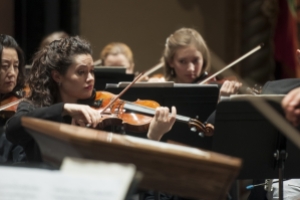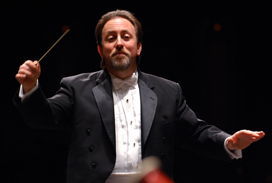 It sounds trite to say it, but if you only make it to one Knoxville Symphony Orchestra concert this season, this week’s Masterworks pair should be it. KSO music director and conductor, Lucas Richman, will be conducting his last concert with the orchestra after a 12 year tenure.
It sounds trite to say it, but if you only make it to one Knoxville Symphony Orchestra concert this season, this week’s Masterworks pair should be it. KSO music director and conductor, Lucas Richman, will be conducting his last concert with the orchestra after a 12 year tenure.
Aside from the obvious emotional and/or nostalgic reasons, consider the concert’s program. The bill includes Beethoven’s Overture to Egmont, Tchaikovsky’s Violin Concerto, the first movement of Gustav Mahler’s uncompleted Symphony No. 10, and Maurice Ravel’s La Valse.
Tchaikovsky: Concerto for Violin and Orchestra in D Major, Opus 35
KSO Concertmaster Gabriel Lefkowitz will be the soloist—reason enough to come out this weekend.
When one considers that Tchaikovsky’s Violin Concerto has become one of the most beloved and popular works in the violin repertoire, it is all the more mind-boggling that it had such an uneasy birth. The violinist to whom Tchaikovsky dedicated the work and the intended premiere soloist, Leopold Auer, turned down the work and maintained his dislike of it to his death. The Viennese critic, Eduard Hanslick, wrote a scathing attack on it in Neue freie Presse saying: “The Russian composer Tchaikovsky is surely no ordinary talent, but rather an inflated one, obsessed with posturing as a man of genius, and lacking all discrimination and taste…Tchaikovsky’s Violin Concerto confronts us for the first time with the hideous idea that there may be musicial compositions whose stink one can hear.”
Ouch. Happily, audiences since then have been substantially more receptive. It’s simply impossible not to adore this work.
Ravel: La Valse, Choreographic Poem for Orchestra
Ravel intended La Valse as a ballet for Diaghilev’s Ballets Russe, but it was rejected. (Is there a pattern here?)
La Valse grew from ideas that Ravel had as a tribute to the Viennese waltz form, titled Wien. The composer reworked his ideas when confronted with the possibility of a ballet commission. When the work was previewed for Diaghilev in a two piano version, Diaghilev reportedly said: “Ravel, it is a masterpiece, but it is not a ballet…it’s a painting of a ballet.”
The finished orchestrated work was first performed later in 1920 by the Lamoureux Orchestra.
Mahler: Symphony No. 10 (Adagio)
When Mahler died in 1911, the Symphony No. 10 was incomplete, with the first movement being the only section fully orchestrated. While a virtual cottage industry has grown up around the idea of completing the work from Mahler’s sketched-out ideas, the Adagio movement stands alone as a work that should be heard.
Beethoven: Overture to Egmont
This overture is part of Beethoven’s incidental music to a production of Goethe’s play, first performed in 1810.
Knoxville Symphony Orchestra: “Lucas Richman’s Finale”
Tennessee Theatre, 604 S. Gay Street, Downtown Knoxville
Thursday and Friday, May 14 and 15, 7:30 p.m.
Tickets start at $15








